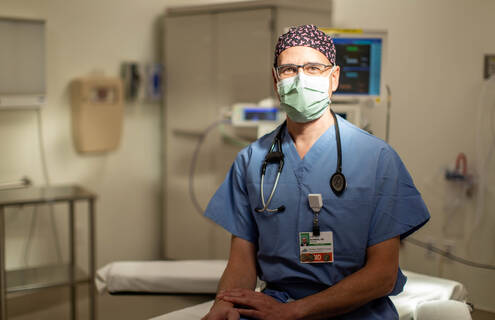
H.E. Guy Burman, MD, is medical director of the Breast Care Center at Cheshire Medical Center. A general surgeon, he performs most breast surgeries at Cheshire and is renown among patients for his thoughtful, compassionate care. We sat down with Dr. Burman to ask his medical advice on breast health, self-exams and cancer screenings.
How often should women get mammograms?
A woman at average risk should obtain mammograms on an annual basis starting at age 40, and continue to follow that timeline as long as they are in good health. Some women, for whom mammograms are stressful or prove too anxiety producing, opt to be screened every other year, or to start when they are 45.
What does a mammogram check for?
Mammograms use low dose x-rays to create a picture of the breast. A radiologist examines that digital picture, looking for areas of distortion, tiny calcium deposits or regions that appear denser than surrounding tissues. Since every person is unique, obtaining a mammogram regularly allows the radiologist to compare the current images to previous images. Sometimes, the changes seen between exams can alert the radiologist to an area of concern.
Why do women need to get mammograms this often?
When found early, breast cancer is much easier to treat and more likely to be cured when it is small and hasn't spread. Mammograms, while not a perfect test, are easily obtained and are a relatively inexpensive way to test many people. Our ability to see cancers on mammograms also continues to improve as technology advances.
In between appointments, how often should women perform self exams?
Some studies show that self breast exams don't catch cancers earlier than mammograms. Because of that, the American Cancer Society doesn't recommend that patients getting routine mammograms need to perform self exams. However, many cancers are identified by patients casually examining themselves, so physicians continue to recommend that patients become familiar with their bodies to help identify a change, if and when it occurs.
What should a patient look for when doing a self-exam?
Nipple retraction or a change in the contour of the breast or a palpable lump in the breast. Sometimes a patient will also have persistent crusting of the nipple. It is very uncommon for breast tenderness to be associated with cancer. But often a patient will have some tenderness and will find a lump because they are examining their breasts more carefully because of that tenderness.
When should someone contact their physician?
If you find a lump or any of the things I just described, if the breast seems to be getting red or there is a change to the breast that is new for you, you should be evaluated. Finding abnormalities early is always best, as breast cancer is most treatable when found early. The nice thing now, compared to when I started treating it more than 20 years ago, is that we are able to do more about breast cancer and more to help patients, while actually doing less and less from a surgical standpoint.
Breast cancer resources
- Dartmouth Cancer Center offers online resources for those with breast cancer, including a typical patient journey.
- CancerCare provides support, stories of hope and resources for patients, survivors, caregivers and healthcare professionals.
- The National Breast Cancer Coalition focuses on eliminating breast cancer through advocacy and action.
- NH Breast Cancer Coalition is a grassroots organization who advocates for and provides assistance to New Hampshire residents with breast cancer.
- Susan B. Komen Foundation is dedicated to supporting research which can prevent and cure breast cancer.
- Cancer.net provides information to help patients understand all levels of their diagnosis and care.
- American Cancer Society offers a wealth of resources for patients and families of those diagnosed with breast cancer and non-cancerous breast conditions.